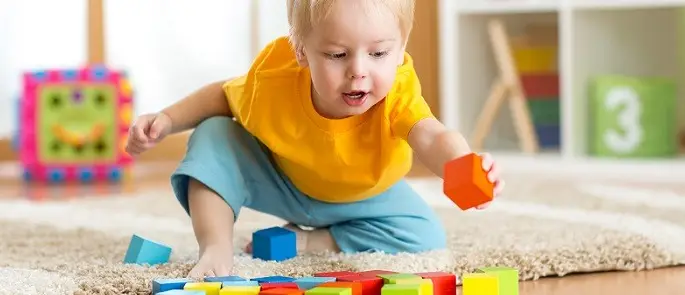What Role Does Play Have in Child Development?
Play is an essential part of a child’s life. From infancy to adolescence, children engage in various forms of play, whether it’s solitary, social, pretend, or physical. But why is play so crucial to a child’s development? Research suggests that play is not just a fun activity but also a powerful tool that influences cognitive, emotional, social, and physical development. In this article, we will explore how different types of play contribute to child development and why encouraging play is vital for children’s well-being.
Types of Play and Their Importance
1. Physical Play
Physical play involves activities that require movement. It includes running, jumping, climbing, and other physical activities. This form of play helps children develop motor skills, coordination, balance, and strength. Physical play is crucial for fostering healthy physical development and overall fitness.
- Benefits:
- Enhances gross motor skills (large muscle groups).
- Improves fine motor skills (hand-eye coordination, dexterity).
- Encourages physical fitness and active lifestyles.
- Reduces stress and promotes better sleep.
2. Cognitive Play
Cognitive play involves activities that stimulate mental processes such as thinking, problem-solving, and learning. It includes activities like puzzles, games, and role-playing that require children to think critically and make decisions.
- Benefits:
- Stimulates brain development and memory.
- Enhances creativity and imagination.
- Builds problem-solving abilities and strategic thinking.
- Encourages intellectual curiosity and a love for learning.
3. Social Play
Social play refers to interactions with peers or adults. This includes group activities, cooperative games, and pretend play with other children. Social play is essential for developing communication skills, emotional regulation, and the ability to work as part of a team.
- Benefits:
- Develops social skills such as sharing, negotiation, and teamwork.
- Helps children understand empathy and develop emotional intelligence.
- Encourages conflict resolution skills.
- Builds relationships and friendships.
4. Pretend Play
Pretend play, or imaginative play, occurs when children engage in make-believe scenarios. This type of play allows children to explore different roles, scenarios, and possibilities, fostering creativity and social understanding.
- Benefits:
- Enhances creativity and imagination.
- Improves language skills as children create stories and narratives.
- Promotes emotional development by allowing children to express feelings.
- Fosters problem-solving abilities as children navigate through imaginary situations.
Cognitive Development Through Play
Play offers a natural way for children to explore the world around them and develop cognitive skills. Through play, children learn about cause and effect, develop memory and attention skills, and improve their ability to focus on tasks. Puzzle games, board games, and educational toys help children develop logical thinking and spatial awareness.
Play and Brain Development
The brain undergoes significant development during childhood, and the experiences children have in their early years directly impact brain structure and function. Play has been shown to stimulate the development of neural connections and supports cognitive abilities such as reasoning, memory, and language development.
Emotional and Social Benefits of Play
Beyond cognitive growth, play is also crucial for emotional and social development. When children engage in play, they learn to express and manage their emotions. They experience joy, frustration, excitement, and disappointment, which helps them develop emotional regulation skills. Moreover, play provides opportunities for children to build and strengthen relationships with peers and caregivers, which is vital for emotional well-being.
The Role of Play in Emotional Regulation
Through play, children learn to express their feelings in safe and acceptable ways. Pretend play, for example, helps children deal with complex emotions by allowing them to role-play scenarios where they confront fears, anxieties, or frustrations. This helps children process emotions and learn coping mechanisms.
Social Development Through Play
Social play teaches children how to interact with others, form friendships, and collaborate. It helps children learn vital social skills such as turn-taking, sharing, and conflict resolution. These early social interactions are crucial for building self-confidence and fostering a positive attitude toward others.
Physical Development Through Play
Physical play is integral to a child’s physical growth. Activities like running, jumping, and climbing help develop strength, flexibility, and coordination. Physical play also encourages the development of fine motor skills, as children use their hands and fingers for activities like drawing, building with blocks, or playing with small toys.
Motor Skills Development
From an early age, children engage in activities that help them develop both gross and fine motor skills. Gross motor skills involve large muscle movements (such as walking, jumping, and running), while fine motor skills involve smaller movements that require hand-eye coordination (such as writing, cutting, and grasping objects).
Health Benefits of Active Play
Physical play encourages children to stay active, which is important for overall health. It helps prevent childhood obesity, improves cardiovascular health, and promotes a healthy lifestyle that can continue into adulthood. Additionally, regular physical activity supports better sleep and boosts mood, reducing stress and anxiety.
The Role of Parents and Caregivers in Play
Parents and caregivers play a crucial role in fostering healthy play experiences. Providing a safe and stimulating environment, offering age-appropriate toys and activities, and engaging in play with children all contribute to their development.
Creating a Safe and Stimulating Play Environment
For children to benefit from play, they need a safe space where they can explore and engage in different activities. This includes both physical space and the availability of stimulating toys or resources. Parents can set up play areas with educational toys, books, and open spaces for outdoor play.
Engaging with Children in Play
While independent play is important for a child’s autonomy, adult involvement in play also has its benefits. Participating in play with your child allows you to model social behaviors, encourage creativity, and deepen the emotional bond between you and the child. Simple activities like reading together, playing a board game, or building a fort foster connection and positive development.
Play and Early Childhood Education
Educational settings that incorporate play into their curriculum have been shown to promote stronger learning outcomes. Through structured and unstructured play activities, children in early childhood education settings can enhance their cognitive and social development.
The Importance of Play-Based Learning
Incorporating play into early childhood education is essential for creating an engaging learning environment. Play-based learning allows children to explore subjects like math, science, and literacy in a hands-on and enjoyable way. This approach builds foundational skills and prepares children for future academic success.
Supporting Emotional and Social Growth in School
Schools that encourage play also foster a healthy emotional and social environment. Group activities and outdoor playtime help children develop critical social skills such as teamwork, communication, and emotional intelligence. By emphasizing play as part of the learning process, schools help children build the resilience and adaptability needed for success later in life.
Conclusion
Play is not merely a leisure activity—it is an essential component of a child’s development. From physical and cognitive growth to emotional and social learning, play is at the core of a child’s ability to grow and thrive. Parents, caregivers, and educators must recognize the significance of play and provide children with the opportunities and resources they need to engage in it. By doing so, we ensure that children are well-prepared for a successful and fulfilling future.

